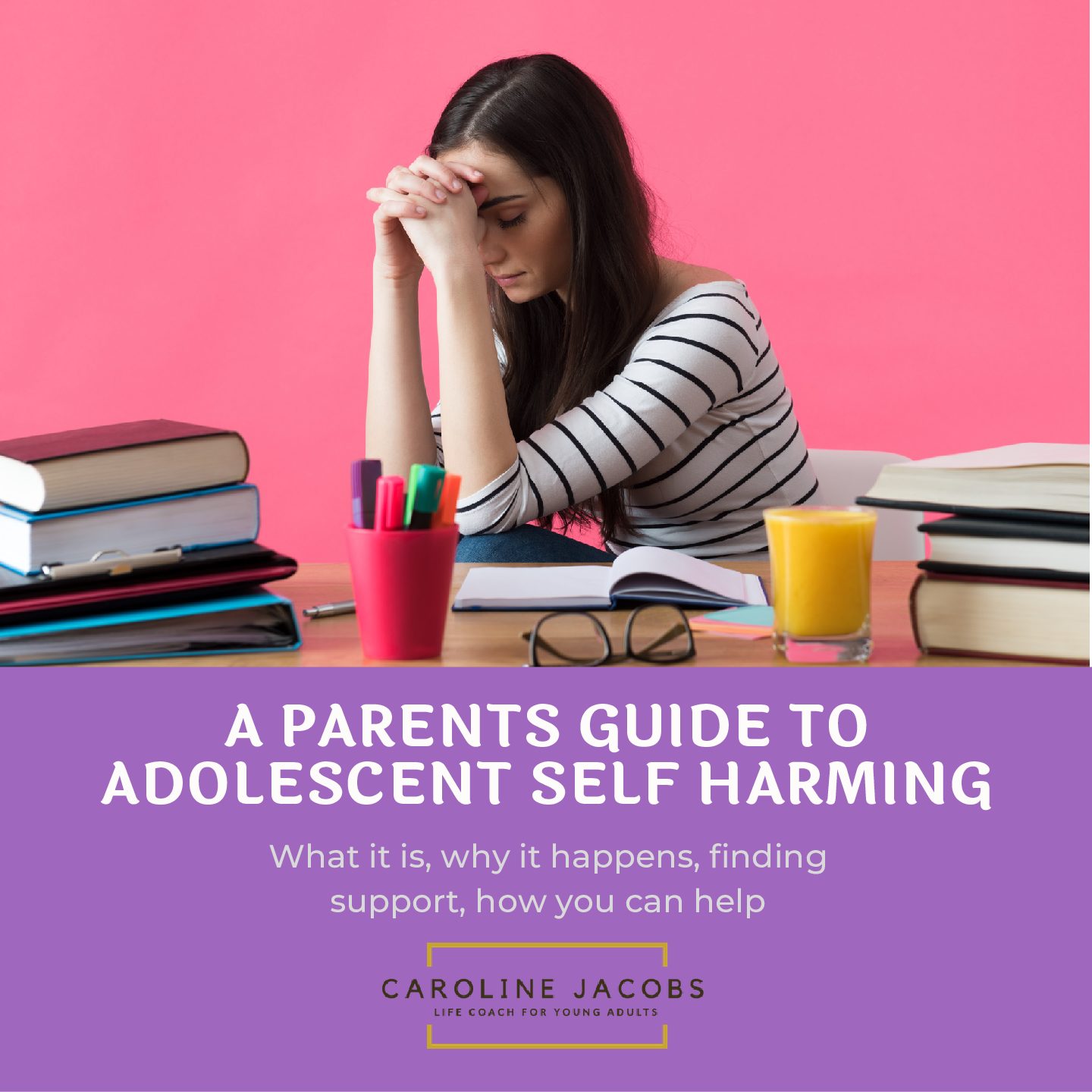As a mother of four young people, previously a high school teacher, and now as a life-coach for adolescents and their parents, I’m all too aware of the devastating effect self-harm can have on both the person who is suffering, and on their friends and family.
Self-harm can often be a crucial outward sign that the mental health of the person suffering has deteriorated. It is essential that adolescents or their parents seek trained medical support when it is discovered or revealed. However, despite the best efforts of everyone working within our education and health sectors, the sad reality is that more and more adolescents are struggling with mental health issues at a time when less financial support is being given to these essential services. You must ALWAYS ask for medical help, but be prepared to have to wait longer than you may like for the appropriate support to be given.
As always, the best cause of action is to try to prevent the need for self-harm in the first place. Despite there being a range of reasons why adolescents self-harm, clear trends have been identified over the past few years and there is action we can all take to support our adolescents:
- We should seek to understand the changes our adolescents go through at this time of their life. Their brains are going through a wonderful transformation that will prepare them for adulthood. Ironically, these changes expose them to possible threats to their welfare as they go through them. Most mental health issues have their origins in the adolescent years. By understanding these changes, we can better respond to the needs of our adolescents.
- Because of the changes happening in their brain, adolescents will have to deal with higher levels of stress and anxiety than adults and may respond to what may seem innocuous situations with what may seem over-emotional As parents, we need to be patient and try to be good role-models of staying calm for our adolescents. We need to constantly remind ourselves that our young adults will have a different perception of what is going on in their lives and we must seek to understand their point of view. We must never be dismissive of their feelings – if they are feeling it then it is real and valid.
- Self-harming is often an expression of a struggle with identity. The adolescent brain naturally sends our children into a search for a new identity as they prepare to define themselves as independent adults. They will be constantly comparing themselves to friends and their heroes. They will be desperate for positive feedback; if its not forthcoming, stress and anxiety will start to dominate their lives. It is important for us as parents to help our children develop a confident and positive image of themselves and the adult they are becoming. I will soon be launching blogs and workshops on how we as parents can help our adolescents discover the type of person they want to become through vision boards and life planning
- The changes taking place in their brain will often lead many young people to focus on what they see as negative aspects of their personality. As parents, we can help them turn around the mental image they have of themselves. We should be seeking to constantly remind them about the many attractive aspects of their personality and praise them often for the many things they get right in life. Get your adolescent to start thinking about positive affirmations (I know I am a kind person, I know I am a great listener, etc …) each morning – the longer they can keep this up, the stronger their self-image will become.
- Little changes, like starting positive affirmations, can have a significantly positive effect on our lives if we can maintain them and turn them into good habits. The sooner we get our adolescents to adopt positive mental health habits, the more likely they will be able to maintain them and the stronger the influence will be on their lives. Go out of your way to encourage your adolescent to engage in regular physical exercise, eat healthily or take up extra-curricular activities at school and elsewhere. All these are proven ways of improving self-esteem and mental well being.
- Teenagers will either start to spend more time with their friends or retreat into isolation, both of which may increase the risk of self-harm. If they are spending a lot of time with friends, monitor what they are doing and who they are with. Ask regular casual questions about their friends and what they are up to. Make it clear that their friends are welcome to visit them at your home. By knowing as much as you can about their friendship groups, you are increasing the opportunity to find out if any of them are experiencing stress or anxiety, and possibly engaging in self-harm. This is important – if one friend is self-harming as a way of dealing with negative feelings their friends will often copy the action as a means of dealing with their own.
- If your young person is starting to isolate themselves, create opportunities for them to join the family or to meet with others. Help them find groups they can join in pursuit of common interests. You may wish to explore limiting their access to computers or similar technology when they are in their bedroom. Not only will this help them sleep better, it will also help you to be aware of their internet habits.
- Create opportunities to have quality, one to one time with your daughter or son. Invent reasons to spend time with them (if you have to!). Use that time to have a chat about issues that may be affecting them. Be subtle with your questions; you may want to ask about their friends as a way of finding out if there are any issues your own child is struggling with.
You may also wish to consider hiring a life-coach, like myself, for you or your daughter or son. I provide online one to one coaching support for both, lending the support and guidance needed to ensure your adolescent can not only survive the adolescent years but can go on to lead a happy and successful adult life. As a parent you are just as deserving of guidance and support, by understanding yourself better you will be able to help your son or daughter with less stress and even more effective care.
I would love to hear from you so please do not hesitate to get in touch, either via email, DM or by booking a free face to face call.
Knowing that you deserve happiness and success,
Caroline







Leave A Comment